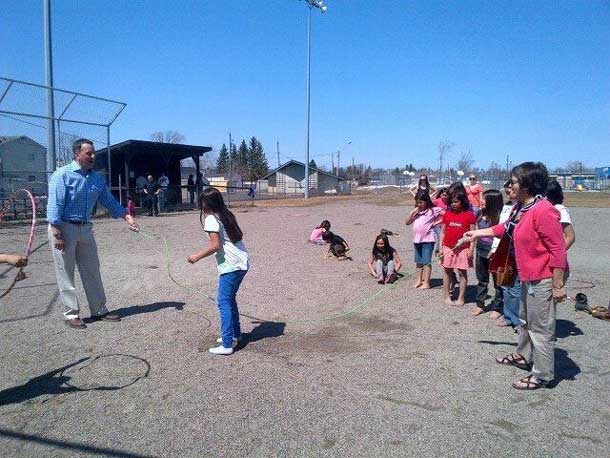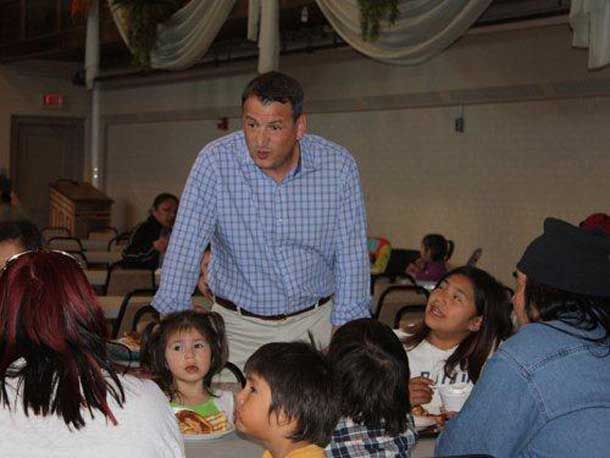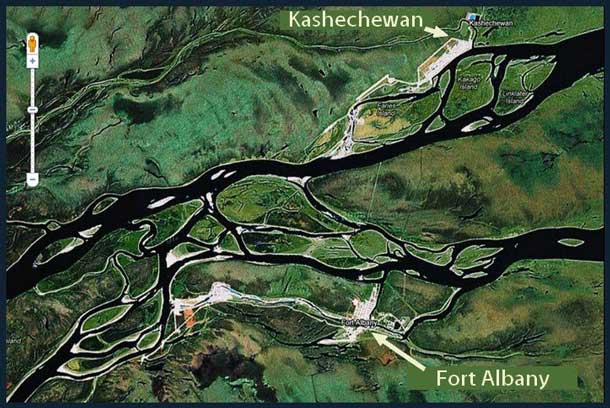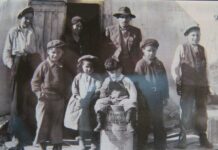
THUNDER BAY – Greg Rickford, MP for Kenora, met today with evacuees of the Kashechewan First Nation, as well as with His Worship Alan Spacek, Mayor of Kapuskasing, to discuss the government’s response to flooding in Northern Ontario.
Flooding in the northern part of Ontario, in communities like Kashechewan, Attawapiskat, Moose Factory Cree and other Northern communities happens as the ice melts in the spring.
“This week, I reached out to the leadership in each of the three Northern Ontario First Nations most seriously affected by flooding – Kashechewan, Fort Albany, and Attawapiskat – to reiterate our government’s commitment to working with them in response to this season’s flooding” stated Aboriginal Affairs Minister Bernard Valcourt.
Flood Evacuees in Thunder Bay
In Thunder Bay there are evacuees now lodged in the city. “Thunder Bay, like many communities across Ontario, is stepping up to the plate to assist our neighbours in need,” said Mayor Keith Hobbs. “Thunder Bay knows first-hand how devastating a flood can be, and will provide humanitarian aid. Given that we are a medical hub and have the appropriate facilities, it makes sense for us to host the Stage 1 evacuees.”
Mayor Hobbs declared a State of Emergency for Thunder Bay on Saturday, in order to become a host community under an agreement with Aboriginal Affairs and Northern Development Canada.
Thunder Bay has currently welcomed 166 members of Kashechewan First Nation’s vulnerable population following the reunification of family members that were sent to Cornwall, Ontario earlier this week.
“Over the past few months my department has provided expert advice, emergency preparations support, training and funding directly to First Nations at risk in Saskatchewan, Manitoba and Ontario to support flood preparedness measures,”states Minister Valcourt.
Minister Valcourt issued the following statement:“Today in Kapuskasing, Mr. Rickford reaffirmed the government’s commitment to working closely with provincial emergency management organizations, the leadership of the city of Kapuskasing and the Kashechewan First Nation to ensure that the immediate health and safety needs of evacuated community members continue to be met.

“Mr. Rickford had the chance to engage and interact with Kashechewan community members and he acknowledged that this is a difficult time for them, and all other communities affected by flooding this season. He confirmed that once the immediate emergency is over, the government’s priority will be to work with the First Nation to expedite the recovery effort so that people can return to their communities.
“He also acknowledged Paul Wesley, First Nation Liaison, for his efforts and thanked him for his leadership. Mr. Wesley said: ‘Our community members are now settled in Kapuskasing. I am pleased with the response of the Town of Kapuskasing and the federal government. My priority as a First Nation liaison is that our children and youth are taken care of. We continue to keep the youth and children busy and socialize with the elders and adults.’
In his meeting with Mayor Spacek, Mr. Rickford thanked him for welcoming and supporting the evacuees during their moment of need. The Mayor said: ‘Our community is always ready to help its neighbors in a time of need, but the quick, effective response to this year’s flooding is the direct result of a collaborative effort. I am fully satisfied with the federal government’s responsiveness and their commitment to ensuring the immediate needs of evacuees are met.’
During his visit, Mr. Rickford took the opportunity to have a discussion with Gerry Demeules, General Manager of Protective Services for the Town of Kapuskasing, and thanked him for the important work he was doing. Mr. Demeules said: ‘It is a coordinated effort here in Kapuskasing to ensure that all of the evacuated members of Kashechewan are comfortable. The Town of Kapuskasing is working very well with the Federal Government, the Red Cross and the Province of Ontario to ensure the immediate needs of evacuees are met. Members of the First Nation are also taking on evacuation coordination roles throughout this process.’
In addition to his meeting with evacuees, the Mayor, the General Manager of Protective Services and the Ontario Provincial Police, Mr. Rickford also took part in an Evacuation Control Group meeting that included as well the local Friendship Centre, Emergency Management Ontario, the Red Cross and AANDC officials who determine on a daily basis the specific needs for evacuees.
In Kapuskasing, and Thunder Bay it is very likely that the evacuees will be out of their community for at least a month. Rickford explained that in Kapuskasing, plans are already underway to open a school in the community so that those youth can resume studies.
Today, the MP, who has a lot of experience in the north, including working with the people in Fort Severn engaged with the youth. They enjoyed some games, playing outside and getting some exercise.
In an interview, Rickford explained that people from Kashechewan are making the best of the situation. The evacuees in Kaspuskasing total 298 people, and 130 are young people. “Kapuskasing has been amazing,” stated Rickford. “At the community centre they are providing three meals a day for the evacuees.”
There have been some mix-ups, one resident, Mr. Loon was separated from his family and ended up in Cornwall Ontario. He is being brought to Kapuskasing to re-unite with his family.
Rickford reiterated that the federal government’s priority remains the health and safety of community members, and the safe return of evacuees to their communities.
Flooding Backgrounder

Although it’s been in the news quite a bit lately, many people in Thunder Bay are unaware of the flooding in the James Bay area, and the evacuation of many communities. One community is Kashechewan, which has been evacuated due to flooding and sewer back ups. It is a fly-in community with winter road access available for only four months of the year, and a population of around 1,700.
Once a state of emergency was issued The city of Thunder Bay agreed to take in 153 of the evacuees, many of which are elders, infants, children, and their parents. Some of the Kashechewan residents have never been off the reserve before and therefore are not used to city life. Things we take for granted like, traffic lights, a lot of cars on the road, and even public transportation are unfamiliar to some of the evacuess, and may be a little intimidating.
It is asked that the people of Thunder Bay be tolerant and kind to our 153 guests who may not know to use the traffic light instead of running across the road. These guests in our city are not here by choice, some are separated from family and very far from everything they know. It may take as long as a month before it is safe for them to return home, and even then they will have to deal with the damage caused by flooding and sewer back-ups.
While people in Thunder Bay impacted by flooding have access to large stores, many are still waiting to solve all the problems caused by the flooding last May.
Residents of Thunder Bay who experienced evacuation and massive flooding for the first time can likely relate somewhat to what the residents of Kashechewan are dealing with.
Please be patient, compassionate, empathetic and understanding towards our guests. If they are crossing the street, please stop and let them cross safely. It only takes a moment to be polite and being kind to them will be something they remember about Thunder Bay after they have returned home.
Let us use this opportunity to welcome these people and show them that Thunder Bay does indeed have a giant heart once again.
NNL Report with files from Linda Henshell.







